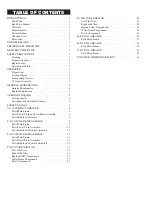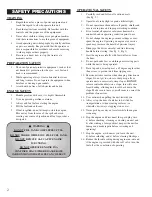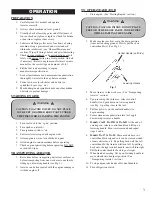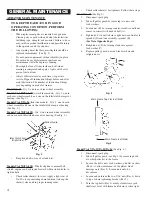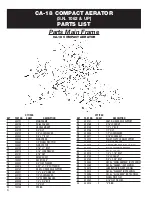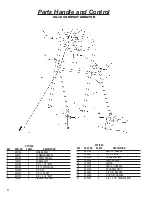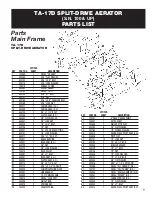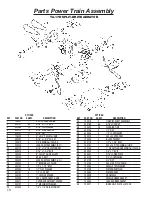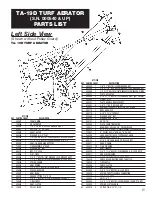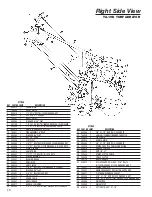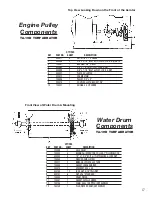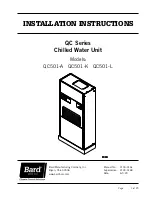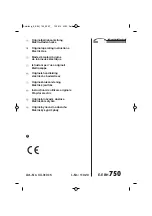
2
OPERATIONAL SAFETY
1.
Carefully read and follow all caution decals.
(See Pg. 5.)
2.
Operate only in daylight or good artificial light.
3.
Do not operate machine unless all guards, shields and
covers are in place and in proper working condition.
4.
It is essential all operator safety mechanisms be
connected and in operating condition prior to use.
5.
Do not change the engine governor settings or over-
speed the engine. Operating an engine at excessive
speed may increase the hazard of personal injury.
6.
Disengage the drive control(s) and tine lowering
handle before starting. (See Pg. 3, Fig 1.)
7.
Start the engine carefully with feet well away from
the tines.
8.
Do not put hands, feet or clothing near rotating parts
while the unit is being operated.
9.
Travel up and down slopes at a 45 degree angle rather
than across, to prevent unit from tipping over.
10. Exercise extreme caution when changing direction on
slopes. Do not get too close to sharp drop-offs or
operate unit on excessively steep slopes.
DO NOT
release control handle(s) on a slope, this will cause
free wheeling, allowing unit to roll back down the
slope. Make sure to leave yourself room to correct the
problem if one arises.
11. Use caution when pulling the unit towards you.
12. Always stop the tines if unit has to be tilted for
transportation or when crossing surfaces (i.e.
sidewalks, driveways, stepping stones, etc.).
13. Never pick up or carry an Aerator while the engine
is running.
14. Stop the engine and disconnect the spark plug wire:
a) before checking, cleaning or working on unit, and
b) after striking a foreign object (inspect the unit for
damage and make repairs before restarting and
operating).
15. Stop the engine: a) whenever you leave the unit,
b) before refueling, and c) before clearing blockages.
16. Reduce the throttle setting during engine run-out and,
if the engine is provided with shut-off valve, turn the
fuel off at the conclusion of operating.
SAFETY PRECAUTIONS
TRAINING
1.
Regard the unit as a piece of power equipment and
teach this regard to all who operate this unit.
2.
Read the instructions carefully. Be familiar with the
controls and the proper use of the equipment.
3.
Never allow children, teenagers or people unfamiliar
with these instructions to use this piece of equipment.
4.
Avoid operating unit while people, especially children
or pets, are nearby. Keep in mind that the operator or
user is responsible for accidents or hazards occurring
to other people or their property.
5.
Be sure you know how to stop the Aerator at a
moments notice.
PREPARATION SAFETY
1.
The use of personal protective equipment, such as (but
not limited to) protection for the eyes, ears, feet and
head is recommended.
2.
While operating, always wear substantial foot wear
and long trousers. Do not operate the equipment when
barefoot or wearing open sandals.
3.
Area should be free of all obstacles and debris.
ENGINE SAFETY
1.
Handle gasoline with care; it is highly flammable.
2.
Use an approved gasoline container.
3.
Always add fuel before starting the engine.
4.
Fill the fuel tank outdoors.
5.
If fuel is spilled, do not attempt to start the engine.
Move away from the area of the spill and avoid
creating any source of ignition until fuel vapors have
dissipated.
WARNING
DO NOT FILL TANK COMPLETELY FULL.
DO NOT SMOKE WHILE YOU FILL FUEL TANK.
DO NOT REMOVE GAS CAP IF ENGINE
IS RUNNING.
DO NOT OPERATE ENGINE IN A
CONFINED SPACE WHERE DANGEROUS
CARBON MONOXIDE FUMES CAN COLLECT.
Содержание 48-RT
Страница 29: ......


